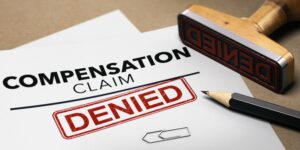Being involved in a car accident can be stressful enough, but when you’ve suffered an injury or property damage and an insurance provider denies your claim, the situation reaches a new level of frustration. If you have been notified that your car accident claim has been denied, you may be left wondering what to do next or where you can turn for help.
By working with an experienced and effective car accident lawyer, you can put the future of your case in reliable hands and have confidence that every option will be explored to pursue the compensation you deserve. From guidance on how to respond to the insurance company’s claim denial to the appeal process to preparing for the possibility of litigation, having a knowledgeable car accident attorney in Tacoma is always the best choice. Read below for more information about what you can do in the wake of a car accident claim denial, and reach out to schedule a consultation to discuss your options.
Understanding Why Insurance Companies Deny Claims
In the immediate wake of a denied car accident claim, it is vital to understand why the insurance company issued the denial. There are a wide variety of reasons why insurance providers deny car accident claims, and though some of them may be obvious, others can be complicated to understand. Knowing why insurers deny car accident claims can help you find your way through the following process and prepare you to explore different options to seek a different outcome.
Common Reasons for Denial
When policyholders file car accident claims, insurance companies may deny them for various reasons. While this often leaves the claimants confused and frustrated, learning why insurance providers deny some claims can help address issues and strengthen your claim. Some of the common reasons insurers deny car accident claims include:
- Incomplete Paperwork: Missing or inaccurate documentation can wreck a claim.
- Liability Disputes: The insurance company may disagree on who is at fault.
- Policy Exclusions: An accident may fall beyond the scope of the policy’s coverage.
- Alleged Violations: Reporting after a deadline or failing to cooperate with the insurer.
- Disputed Damages: The severity of injuries or cost of repairs may not be agreed on.
Knowing about the factors listed above and whether or not any of them pertain to your particular accident claim can be beneficial when it is time to work with your lawyer to devise a strategy to refute the insurance company’s reasons for the denial.
Reading the Fine Print

Knowing the details of your auto insurance policy is vital under any circumstances, but when you’ve been in a car accident and are wrestling with the insurance company of a denied claim, it becomes even more important. Intricacies within the fine print of your policy can dictate what is or isn’t covered. Exclusions, coverage limits, and other special requirements and stipulations can be found here. Failure to understand these policy terms can result in denied accident claims, meaning you can be left without coverage after your accident. Reviewing your policy can lay the foundation for avoiding potential pitfalls and disputing claims the insurance provider makes.
Steps to Take Immediately After a Denied Car Accident Claim
Though dealing with a denied car accident claim can be overwhelming and stressful, promptly taking the appropriate steps can make a difference in the following process. Your initial response should be proactive. Rather than ignore the denial of your claim, look at it as a starting point to take further action. Once you understand why your car accident claim was denied, you can work with your attorney to explore options for appeal and prepare for subsequent steps. Moving swiftly and decisively can positively impact your chances of reaching a more favorable outcome.
Review the Denial Letter
The insurance company’s denial letter is the first key to understanding why your car accident claim was denied. Read through the letter carefully with your lawyer and attempt to identify specific reasons for rejecting your claim. Finding mentions of policy provisions, missing documentation, or other problems can help you and your car accident attorney plan your next steps. Once a thorough review of the denial letter is completed, it will be time to prepare to dispute it.
Collect & Organize Documentation
Collecting all documentation pertaining to your accident, injuries, and claim filing is vital following a claim denial. This documentation can include law enforcement accident reports, medical records, estimates for repairs to your vehicle, photos or video footage from the accident scene, and any communication with the insurance company. Keeping a detailed and well-organized file for your claim can allow quick and easy reference and support should you choose to appeal the denial or even proceed to litigation later. Having all documentation gathered and easily accessible is vital to effectively challenging a car accident claim denial.
Seek Clarification
Requesting clarification from the insurance company following the denial of your claim can often be an important step in the process. Having your lawyer communicate with the insurer’s agent, customer service representative, or adjuster assigned to your claim can provide helpful information about the denial of your claim. Clearing up misunderstandings, having questions answered, and gaining clarification on the insurance company’s position will help you and your car accident attorney better plan your next steps, whether it be an appeal, mediation, arbitration, or legal action. However, it is important to remember that allowing your lawyer to handle all communications with the insurance company is always in your best interest.
How to Dispute a Denied Car Accident Insurance Claim

Knowing the process to dispute a denied car accident claim is important when preparing to take action to change the outcome. After reviewing the insurer’s denial letter and gathering all pertinent evidence and documentation that support your claim, you and your lawyer will determine the best course of action for your specific circumstances. Your attorney can provide insight into the dispute process, including how insurance companies handle internal appeals, writing an appeal letter, and the pros and cons of going through mediation or arbitration to seek a favorable resolution.
Internal Appeal Process
The insurance company’s internal appeal process is the first opportunity you will have to dispute the denial of your car accident claim. Typically, the appeal process begins when the policyholder whose claim was denied sends a formal appeal letter to challenge the denial. After filing the appeal, the process continues with submitting additional evidence to support your claim (including documentation such as medical records, witness statements, and other pieces of information). Meeting all deadlines and adhering to all procedural requirements is necessary during this process. Following this process can allow you to reverse the denial of your claim.
Writing an Appeal Letter
Submitting an appeal letter is the first step in officially initiating the appeal process. The letter should be clear, concise, and directed toward responding to the specific reasons for your claim denial outlined in the insurance company’s denial letter. Be sure to reference your claim number and summarize the events of your accident. Your appeal letter should also include any new evidence or documentation that may support your claim, such as corrected paperwork, new medical records, and other evidence. Point out any errors or misunderstandings in the denial letter and request clarification or reconsideration. Your lawyer can help put together a well-crafted appeal letter to communicate your request effectively.
Third-Party Mediation or Arbitration
If an internal appeal does not resolve your denied claim satisfactorily, third-party mediation or arbitration may offer an alternative path to seek a better outcome. Mediation involves a neutral party who will facilitate negotiations between you and the insurance provider to reach a mutually agreed-upon settlement. Alternatively, arbitration involves an impartial arbitrator hearing arguments from both sides before rendering a binding final decision. Mediation and arbitration are typically quicker, less formal, and cheaper than going to court. Consulting with your lawyer can help determine if either course of action will be beneficial in your situation.
Legal Options If Your Appeal Is Unsuccessful
Suppose your appeal of the denied car accident claim is unsuccessful. In that case, your lawyer may advise you on other available legal options to reverse the denial and seek the compensation you need. Having an experienced car accident attorney who can explain your rights and the potential legal remedies to your situation is vital. Though taking legal action and filing a lawsuit is a complex process, it may be your best option to secure the desired outcome.
When to Consider Legal Action

Thinking about filing a lawsuit against the insurance company may be necessary if all other efforts to reverse the denial of your car accident claim have fallen short. If the insurance provider has denied your claim, denied your appeal, and refuses to negotiate further, it can be time to explore other options. Your lawyer can explain whatever legal remedies may be available and guide you in the right direction. Your attorney will honestly assess whether your case is strong enough to file a lawsuit, providing you with the insight you need to make the critical decision to move forward.
Hiring an Attorney
As stated above, hiring an attorney should be your first step following a car accident — even before you file your initial auto insurance claim. If your claim is denied and the appeal process proves unfruitful, having an attorney who can help navigate the legal landscape can improve your chances of reaching the desired outcome. A car accident lawyer can provide:
- Case Evaluation: Skilled assessment of your case’s value and potential strategies.
- Negotiation Skills: Communicating with the insurance company to pursue a settlement.
- Litigation Experience: Representation in court if filing a lawsuit is necessary.
Choosing the right attorney can safeguard your rights and handle your case correctly.
Filing a Lawsuit Against the Insurance Company
Once the decision has been made to take legal action, filing a lawsuit against the insurance company is the first and most significant step in the legal process. Your lawyer will file the necessary paperwork to formally accuse the insurance provider of wrongfully denying your accident claim. After filing the formal complaint, your attorney will gather evidence to present your case in court. Though the legal process can be complex, time-consuming, and costly, it may be your last and best chance to secure the compensation you need following your accident.
Contact an Experienced Car Accident Lawyer Today
When you’re left dealing with the aftermath of a car accident in which your insurance claim has been denied, there are multiple factors to consider. What can be done now? Is it possible to appeal a claim denial? How does the process work? If an appeal fails, what other options are there? With so much going on after your car accident, these uncertainties can quickly become overwhelming.

Thankfully, options are available to you, and the first and best option is to hire a skilled car accident lawyer to help you through your situation. Your lawyer will learn the details of your story, investigate the accident and how your claim was handled by the insurance company, and walk you through the process of appealing your claim denial — even through litigation, if necessary.
If you have been involved in a car accident and your insurance claim has been denied, it's important to reach out to an experienced car accident lawyer as soon as possible. Dealing with insurance companies can be a frustrating and complex process, and having a knowledgeable attorney on your side can make all the difference.
If you received a claim denial letter from the insurance company, you don’t have to feel like your chance to obtain compensation is over. Strong guidance is available through the help of skilled legal representation. You don’t have to take the insurance company’s initial denial as the final word. Contact an experienced Tacoma personal injury attorney today to schedule a consultation to learn more about the options available to you to seek the outcome you deserve. Don’t delay, call today.